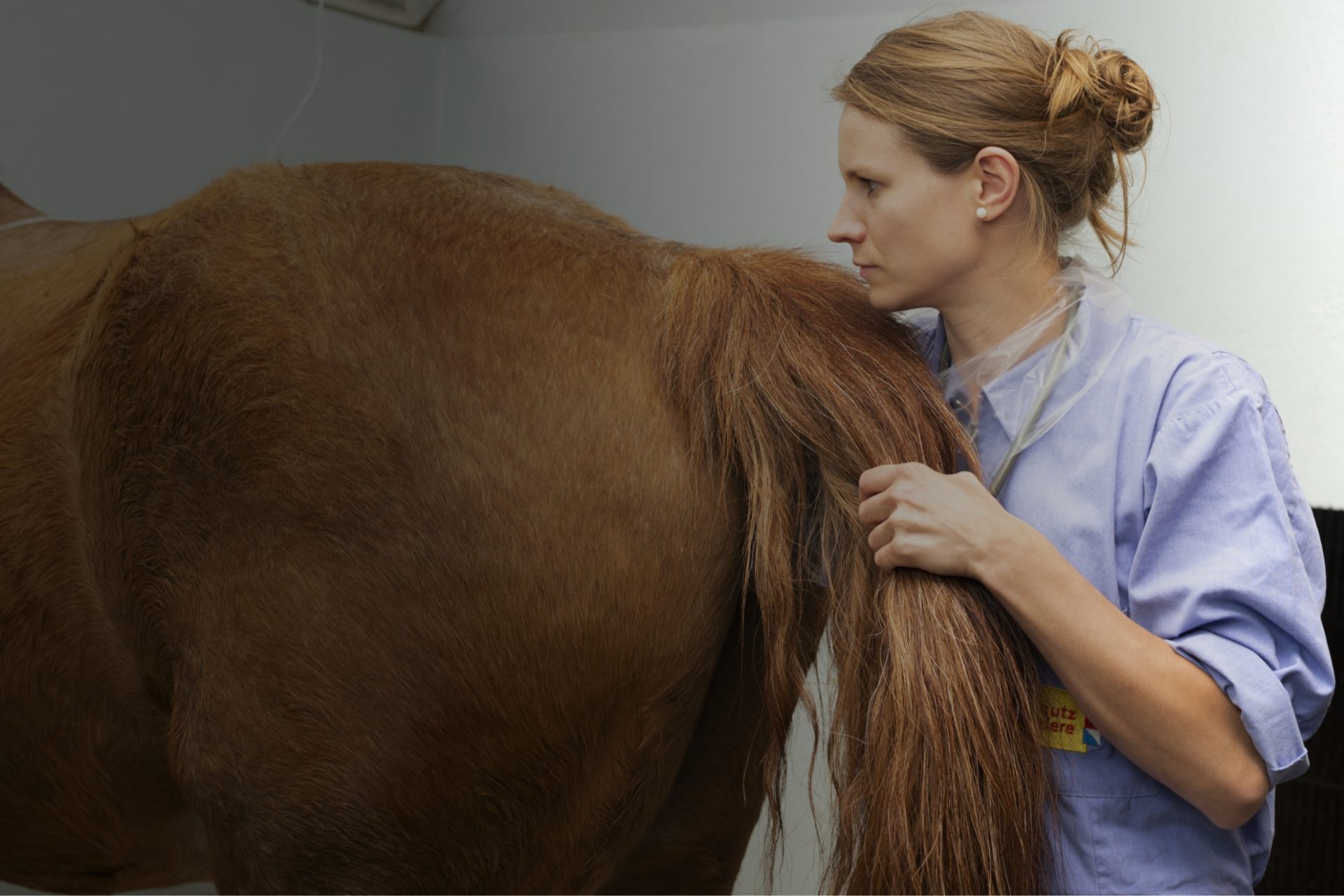

The stomach, small intestine and large intestine are part of the gastrointestinal tract. The typical sign of an acute gastrointestinal (GI) disease is colic – acute abdominal pain caused by intestinal spasms, constipation, mechanical bowel obstruction, or displacement or twisting of the large colon. Chronic colic, weight loss, diarrhoea and performance problems are also typical signs of GI diseases. Commonly associated conditions include gastric ulcers, parasitic infestation, peritonitis and intestinal inflammation. Endoscopies, ultrasound scans and laboratory tests are often used, though the size of the equine peritoneal cavity often poses a significant challenge to the examination.
Find specialistEquine soft tissue surgery primarily relates to abdominal/colic surgery and operations in the region of the urinary system, the sexual organs, and the upper and lower respiratory tracts, as well as operations on the skin.
The specialist field of internal medicine subsumes a number of subareas and deals with the diagnosis and treatment of diseases of the internal organs. These include diseases of the gastrointestinal tract, the respiratory system, the urinary system, the blood and blood-forming organs, the muscles, the nervous system and the skin, plus hormonal and metabolic disorders and all infectious diseases.
Intensive care and emergency medicine involves administering first aid in serious emergencies as well as providing care to and monitoring horses and foals with life-threatening illnesses. This also includes post-operative care to patients in need of intensive care.
The specialist field of anaesthesia is concerned with professionally sedating and anaesthetising horses and sparing them unnecessary pain. Thanks to state-of-the-art methods and gentle techniques, it is now possible to perform complicated surgical procedures and life-saving emergency operations on seriously injured or sick horses and to transport them safely.
Equine soft tissue surgery primarily relates to abdominal/colic surgery and operations in the region of the urinary system, the sexual organs, and the upper and lower respiratory tracts, as well as operations on the skin.
The specialist field of internal medicine subsumes a number of subareas and deals with the diagnosis and treatment of diseases of the internal organs. These include diseases of the gastrointestinal tract, the respiratory system, the urinary system, the blood and blood-forming organs, the muscles, the nervous system and the skin, plus hormonal and metabolic disorders and all infectious diseases.
The specialist field of anaesthesia is concerned with professionally sedating and anaesthetising horses and sparing them unnecessary pain. Thanks to state-of-the-art methods and gentle techniques, it is now possible to perform complicated surgical procedures and life-saving emergency operations on seriously injured or sick horses and to transport them safely.
Diagnostic imaging is the process of examining a horse using digital X-ray technology, ultrasound, computed tomography (CT), magnetic resonant imaging (MRI) and scintigraphy. Nowadays, many of these diagnostic techniques do not require general anaesthesia and can be performed on a standing horse.
The specialist field of internal medicine subsumes a number of subareas and deals with the diagnosis and treatment of diseases of the internal organs. These include diseases of the gastrointestinal tract, the respiratory system, the urinary system, the blood and blood-forming organs, the muscles, the nervous system and the skin, plus hormonal and metabolic disorders and all infectious diseases.
Intensive care and emergency medicine involves administering first aid in serious emergencies as well as providing care to and monitoring horses and foals with life-threatening illnesses. This also includes post-operative care to patients in need of intensive care.
Diagnostic imaging is the process of examining a horse using digital X-ray technology, ultrasound, computed tomography (CT), magnetic resonant imaging (MRI) and scintigraphy. Nowadays, many of these diagnostic techniques do not require general anaesthesia and can be performed on a standing horse.
The specialist field of internal medicine subsumes a number of subareas and deals with the diagnosis and treatment of diseases of the internal organs. These include diseases of the gastrointestinal tract, the respiratory system, the urinary system, the blood and blood-forming organs, the muscles, the nervous system and the skin, plus hormonal and metabolic disorders and all infectious diseases.
Diagnostic imaging is the process of examining a horse using digital X-ray technology, ultrasound, computed tomography (CT), magnetic resonant imaging (MRI) and scintigraphy. Nowadays, many of these diagnostic techniques do not require general anaesthesia and can be performed on a standing horse.
The specialist field of internal medicine subsumes a number of subareas and deals with the diagnosis and treatment of diseases of the internal organs. These include diseases of the gastrointestinal tract, the respiratory system, the urinary system, the blood and blood-forming organs, the muscles, the nervous system and the skin, plus hormonal and metabolic disorders and all infectious diseases.
Equine soft tissue surgery primarily relates to abdominal/colic surgery and operations in the region of the urinary system, the sexual organs, and the upper and lower respiratory tracts, as well as operations on the skin.
The specialist field of internal medicine subsumes a number of subareas and deals with the diagnosis and treatment of diseases of the internal organs. These include diseases of the gastrointestinal tract, the respiratory system, the urinary system, the blood and blood-forming organs, the muscles, the nervous system and the skin, plus hormonal and metabolic disorders and all infectious diseases.
Intensive care and emergency medicine involves administering first aid in serious emergencies as well as providing care to and monitoring horses and foals with life-threatening illnesses. This also includes post-operative care to patients in need of intensive care.
The specialist field of anaesthesia is concerned with professionally sedating and anaesthetising horses and sparing them unnecessary pain. Thanks to state-of-the-art methods and gentle techniques, it is now possible to perform complicated surgical procedures and life-saving emergency operations on seriously injured or sick horses and to transport them safely.
Diagnostic imaging is the process of examining a horse using digital X-ray technology, ultrasound, computed tomography (CT), magnetic resonant imaging (MRI) and scintigraphy. Nowadays, many of these diagnostic techniques do not require general anaesthesia and can be performed on a standing horse.